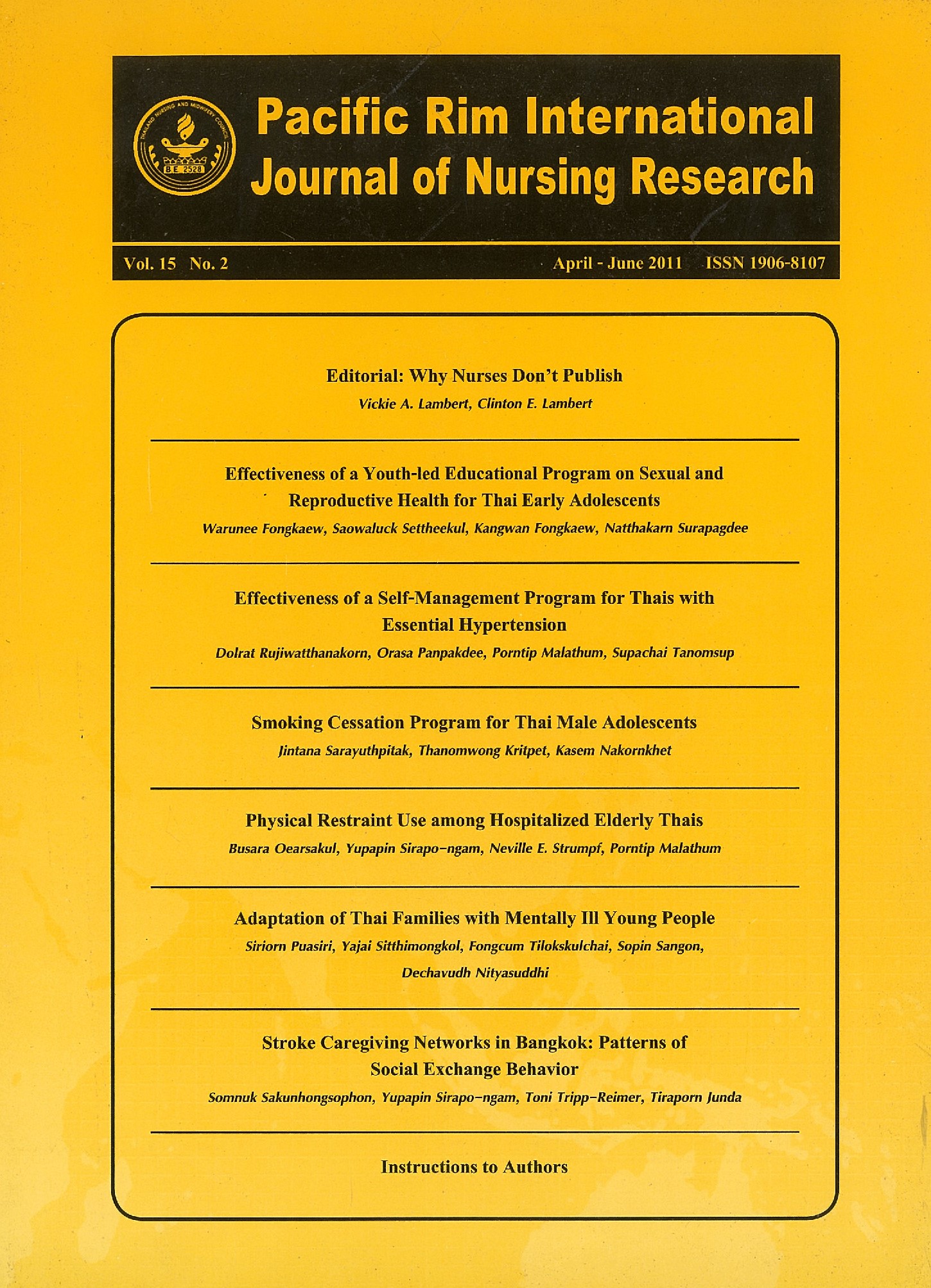Adaptation of Thai Families with Mentally Ill Young People
Keywords:
การปรับตัวของครอบครัว, ความเครียดของครอบครัว, การเจ็บป่วยด้วยโรคทางจิตเวช, เยาวชน, Family adaptation, Family stress, Mental illness, Young peopleAbstract
บทคัดย่อ
การวิจัยนี้เป็นการศึกษาเชิงพรรณณาแบบภาคตัดขวาง มีวัตถุประสงค์เพื่อศึกษารูปแบบความสัมพันธ์ของตัวแปรที่มีอิทธิพลต่อการการปรับตัวของครอบครัวที่มีเยาวชนป่วยด้วยโรคทางจิตเวช โดยใช้กรอบแนวคิด The Resiliency Model of Family Stress, Adjustment, and Adaptation ซึ่งเน้นถึงความแข็งแกร่งของครอบครัว เพื่อให้ครอบครัวมีการเจริญเติบโตและมีพัฒนาการที่ดี กลุ่มตัวอย่างคือ สมาชิกครอบครัวของเยาวชนที่ป่วยด้วยโรคทางจิตเวช จำนวน 237 คนที่มีคุณสมบัติตามเกณฑ์ที่กำหนด และตอบแบบสอบถามซึ่งประกอบด้วย ข้อมูลส่วนตัว, แบบวัดความเครียดในครอบครัว, แบบวัดทักษะชีวิตของผู้ป่วย, แบบวัดการทำหน้าที่ของครอบครัว, แบบวัดการให้ความหมายต่อการเจ็บป่วยของสมาชิกในครอบครัว, แบบวัดความเข้มแข็งของครอบครัว, และแบบวัดการปรับตัวของครอบครัว สถิติที่ใช้ในการวิเคราะห์ข้อมูล คือ โมเดลสมการเชิงโครงสร้าง
ผลการศึกษาพบว่าการปรับตัวของครอบครัวที่มีเยาวชนป่วยด้วยโรคทางจิตเวชมีการปรับตัวได้ดี เมื่อมีความเครียดในครอบครัวในระดับต่ำ มีทักษะชีวิตของผู้ป่วยสูง การทำหน้าที่ของครอบครัวสูง การให้ความหมายต่อการเจ็บป่วยของสมาชิกในครอบครัวในทางบวกสูง และความเข้มแข็งของครอบครัวสูง ความเครียดของครอบครัวมีอิทธิพลต่อการปรับตัวของครอบครัวโดยส่งผ่านการทำหน้าที่ของครอบครัว และการให้ความหมายต่อการเจ็บป่วยในครอบครัว ความเครียดจากทักษะชีวิตของผู้ป่วยมีอิทธิพลต่อการปรับตัวของครอบครัวโดยส่งผ่านการทำหน้าที่ของครอบครัว ซึ่งให้ข้อเสนอแนะว่าควรมีการส่งเสริมการทำหน้าที่ของครอบครัว และการให้ความหมายต่อการเจ็บป่วยในครอบครัวเพื่อช่วยลดอิทธิพลของความเครียดในครอบครัว และความเครียดจากทักษะชีวิตของผู้ป่วย ที่จะช่วยส่งเสริมการปรับตัวของครอบครัวที่มีเยาวชนป่วยด้วยโรคทางจิตเวชได้ นอกจากนี้ผลการศึกษาครั้งนี้ทำให้เกิดความเข้าใจในการพัฒนาโปรแกรมที่นำไปสู่การลดความเครียดในครอบครัวและความเครียดจากทักษะชีวิตของผู้ป่วย การเพิ่มการทำหน้าที่ของครอบครัวและการให้ความหมายต่อการเจ็บป่วยในครอบครัวที่เป็นทางบวก เพื่อส่งเสริมการปรับตัวของครอบครัวที่มีเยาวชนป่วยด้วยโรคทางจิตเวช
คำสำคัญ : การปรับตัวของครอบครัว, ความเครียดของครอบครัว, การเจ็บป่วยด้วยโรคทางจิตเวช, เยาวชน
Abstract
This study, using a descriptive cross-sectional design, aimed to examine factors predicting adaptation of Thai families caring for young people with mental illnesses. The Resiliency Model of Family Stress, Adjustment and Adaptation was used to guide the study. A total of 237 family members of young people with mental illnesses were recruited from four Thai psychiatric hospitals. Participants completed a set of questionnaires, including the: Demographic Data Questionnaire; Thai Family Stress Inventory; Life Skills Profile-20; Chulalongkorn Family Inventory; Demands of Illness Inventory; Family Hardiness Index; and, Family Adaptation Scale. Data were analyzed using descriptive statistics and structural equation modeling.
The results indicated family adaptation was associated with lower family stress, higher patient’s life skills, greater family functioning, more positive family appraisal and higher family hardiness. Structural equation modeling fit indices that suggest family functioning and family appraisal of illness mediate the effect of family stress on family adaptation; thereby, suggesting family functioning and family appraisal of illness may ameliorate the effect of family stress on family adaptation. Family functioning also mediated the effect of patient’s life skills on family adaptation, suggesting family functioning could reduce the effect of patient’s life skills on family adaptation. In conclusion, the findings highlight the importance of family functioning and appraisal of illness in interventions aimed at reducing family stress and promoting family adaptation.
Keywords : Family adaptation, Family stress, Mental illness, Young people
Downloads
How to Cite
Issue
Section
License
Copyright: The Pacific Rim International Journal of Nursing Research, Thailand Nursing & Midwifery Council has exclusive rights to publish, reproduce and distribute the manuscript and all contents therein.







.png)


